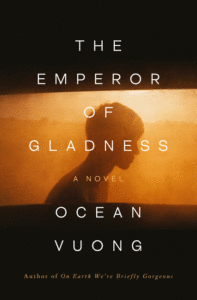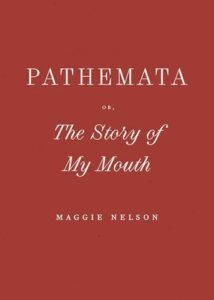
Our bevy of blazing reviews this week includes M John Harrison on Ocean Vuong’s The Emperor of Gladness, Justin Taylor on Carl Hiaasen’s Fever Beach, Fiona Maazel on Honor Jones’ Sleep, Walker Rutter-Bowman on Claire Baglin’s On the Clock, and Sinéad Gleeson on Maggie Nelson’s Pathemata.

“Some of the themes of On Earth We’re Briefly Gorgeous echo through into this novel. We recognise the familial landscapes of the Vietnamese immigration to the US; the need to manage partly assimilated, dangerously unprocessed generational tensions; the sense of life as the pursuit of a second chance. Complex relations between story and backstory also feature, but at a less demanding scale, producing less of a dense lyrical flicker at the sentence level, more of a traditional juggle with larger narrative elements. This is a huge novel in terms of where it directs our attention: from gay self-discovery to the uses of fiction; from the industrial farming of animals to the drive to write yourself free of the parental experience.
…
“We’re all writers now, Vuong seems to suggest. A cheap dinner eaten at HomeMarket under the kitsch but somehow menacing light of a Thomas Kinkade fantasy painting…is a story of reward. Two Dilaudid pills, crushed and snorted, are a story about time out. Any economic aspiration at all is so clearly a fiction. This condition is depicted with the authenticity of experience. At the same time Vuong takes it apart with patience and an ear for dialogue…Heartbreaking, heartwarming yet unsentimental, and savagely comic all at the same time, The Emperor of Gladness is about just how wobbly things can become.”
–M John Harrison on Ocean Vuong’s The Emperor of Gladness (The Guardian)
“Heavily plotted but peppily paced, bursting with quips and blazing with anger, Fever Beach is indeed both feverish and beachy: a bottomless margarita served in a ‘Mueller, She Wrote’ mug. There are a number of humorous set pieces, not least the Strokerz’ road trip to Key West, where an attempt to disrupt a drag show ends in well-deserved humiliation. That said, the novel’s inclination to demean and degrade all too often smacks of the very same politics of cruelty that it’s denouncing.
…
“Notwithstanding the fact that the first plank of their party platform calls for my murder (for being a Jew or leftist, take your pick), I found myself falling into perverse sympathy with the Strokerz, who are despised as much by their patrons as by their enemies, and portrayed as such oafish losers—indeed, such schlemiels—they fail to register even glancingly as a threat.
One running joke is that guys like Figgo and Onus are addicted to the idea of themselves as perpetual victims, and thus must come up with increasingly absurd, bigoted self-deceptions to fuel that fantasy. No argument here. But how hard are we supposed to laugh at this jab when it’s thrown for the 10th time—especially given that Hiaasen’s brand of Daily Show Calvinism means that the novel really is rigged against its born-damned MAGA bubbas?
One never wonders whether they’ll get their comeuppance, only what forms it will take and how debasing it will be (respectively: many, very), and so Fever Beach becomes finally a test of the reader’s own appetite for sanctimony and schadenfreude. As with the bottomless margarita, you’ll have to decide for yourself when enough is enough.”
–Justin Taylor on Carl Hiaasen’s Fever Beach (The New York Times Book Review)
“What surprised me most about Honor Jones’s debut novel, Sleep, wasn’t its smarts or its savvy, or even its astute renderings of motherhood, daughter-hood and the fraught enterprise of trying to regard each one through the lens of the other. No, what surprised me was that out of its careful, orderly prose—every word neatly placed as if on a well-set table—grew an exceptionally moving novel.
Jones takes her cues from writers like John Cheever, Richard Yates and Virginia Woolf, all masters of the repressed and unsayable. She covers the same material—the resentments and traumas that smolder in families wrapped in a suburban idyll—and with similar delicacy and humor. But Sleep also introduces a measure of optimism and generosity I found refreshing.
…
“Jones is interested in the liminal space Margaret finds herself in, a space more psychological than generational: a state of consciousness that hovers between her past and present, resembling the uncertain and unstable experience of sleep. The novel excels when exploring this extrasensory place where we come to terms with our lives.
If this sounds fey, part of the pleasure of Sleep is that it’s grounded in the prosaic; it traces a series of familial episodes that should feel banal but that are instead shot through with feeling.
…
“Jones is very good at capturing how trauma can taint even small moments like these, in subtle and insidious ways — which is perhaps why she’s styled her prose so tightly. There are no crescendos here, no soaring, looping sentences full of ecstasy or dread. Instead she’s hung her prose on a tension rod of unease, a proxy for how Margaret experiences her everyday life. It’s tidy, and it works.”
–Fiona Maazel on Honor Jones’ Sleep (The New York Times Book Review)
“Like treated beef, Baglin’s novel is a lean, finely textured thing. In Jordan Stump’s translation from the French, the novel captures the little triumphs, stinging humiliations, and physical toll of labor. On the Clock’s narrator, a college student, has landed at the fast-food franchise during her summer break.
…
“The prose is kinetic and spare. At the restaurant, a cascade of voices, actions, and thoughts run together. Baglin doesn’t distinguish one voice from another or punctuate dialogue, and the narrator’s attempts to explain her tasks are continually interrupted by the need to perform them. The physical choreography doesn’t correspond to a similarly rich action of thought; often, the demands on the body dull the possibilities of the mind. This consequence is intentional in a workplace that forbids daydreaming and seeks to extend its jurisdiction into the psyches of its workers. Thus, Baglin presents a narrator whose control is unsteady, her authority permeable.
…
“The account of the narrator’s job at the restaurant alternates with childhood memories of her working-class upbringing, featuring budget vacations to public campgrounds and visits to a similar—the same?—fast-food franchise. Sometimes, the alternations occur as frequently as every paragraph. Both timelines are rendered in the present tense, which grants the book a constant and exhausting nowness. I thought of Annie Ernaux’s The Years, in which the narrator promises a text ‘composed in an unremitting continuous tense, absolute, devouring the present as it goes.’ But in On the Clock, the narrator is only occasionally in full command of this ravenous tense; more accurately, she’s another morsel. The relentless present Baglin has engineered suits an insatiable workplace that seeks to squeeze every ounce of productivity from its workers’ bodies and minds. It also creates a world in which personal history feels impossible to manage: what’s happening can’t be converted into what’s happened, the established past; instead, it careens forward into a fraught futurelessness of continuous cycles of financial hardship.”
–Walker Rutter-Bowman on Claire Baglin’s On the Clock (The Baffler)

“The locus of Pathemata (ancient Greek for ‘sufferings’) may be pain and the pandemic, but Nelson has never been a single-subject writer, even in books that professed to be singular, such as Jane: A Murder (the death of her aunt) or Bluets (the colour blue). In this thoughtful work, she excavates the duties of parenthood and care, bodies and ageing, loneliness and mortality. The narrative jumps in time, and the lines between reality, dreams and fiction blur.
Pain is as individual as a fingerprint, and yet Nelson wonders why ‘some people with bites more fucked up than mine have no pain, just like two people could have identical back MRIs but one can’t get out of bed and the other does CrossFit.’ It is not lost on her that the mouth has a symbolic role in the life of the writer: someone whose job revolves round words, while the pain itself remains unamenable to language. Mandatory face covering during Covid brings a realisation of how many emotions are expressed with the mouth. Its visibility means it becomes a site of art: the rapidly moving lips of Beckett’s Not I or The Scream by Munch.
…
“The book’s full title comes from a phrase in ancient Greek meaning ‘learning through suffering,’ which is not as simple as solving what Nelson calls ‘the pain puzzle.’ The pain endured by martyrs and saints suggests penance or ecstasy, but Nelson is neither religious nor seeking absolution. In trying to untangle the problem of her own pain and her experience of disconnection, she invites us to reflect on ours. In outlining her suffering, she prompts us to imagine our own. The singular as metaphor for the collective, urging us to fully inhabit the lives we have, in spite of bodily interruptions, or global distractions.”
–Sinéad Gleeson on Maggie Nelson’s Pathemata (The Guardian)

